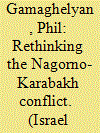|
|
|
Sort Order |
|
|
|
Items / Page
|
|
|
|
|
|
|
| Srl | Item |
| 1 |
ID:
142004


|
|
|
|
|
| Summary/Abstract |
Contrary to mainstream thinking, the existence of diversity does not necessarily condemn a state to instability and chaos. In fact, difference is a good ingredient for progress because each group contributes its unique experiences and peculiar qualities to the cause of a nation. To produce crisis, diversity must be worked on or manipulated. With a view to gaining deeper understanding of the factors that impact on identity diversity to create conflict in Nigeria, a number of conflict theatres in the country were examined. Having explored each case, the article notes that the policies of the colonial state, that emphasised group differentiation, laid the foundation for identity conflicts. The post-colonial state is just as guilty. Its administrative arrangement for managing diversity, the federal character principle (FCP), has failed to exploit the country’s diversity to produce development. Instead, it has deepened the isolation of certain groups, thus, inhibiting national integration. Added to the deliberate manipulation of diversity for personal interests by the political class, the incidence of identity conflicts in the country can be explained. Going forward, the author stresses the need to review the FCP and close all loopholes in its enabling laws that allow for easy misinterpretation and deliberate misapplication.
|
|
|
|
|
|
|
|
|
|
|
|
|
|
|
|
| 2 |
ID:
144678


|
|
|
|
|
| Summary/Abstract |
Israel and the Islamic Republic of Iran have had a problematic relationship for the last four decades. Despite their tense relations, Israel is home to thousands of Persians and Iran has the second largest Jewish population in the Middle East. There are social, political and psychological obstacles to dual identification. Using qualitative thematic analysis and Identity Process Theory, this article examines the construction and management of Persian/Iranian and Jewish/Israeli identities among these groups. The following themes are discussed: (1) the challenges and maintenance of dual identification, (2) breaking down boundaries between identities, and (3) Persian-Iranian or Jewish-Israeli? Establishing coherence in identity. Results suggest that, while the social and political institutions in Iran and Israel construct barriers to dual identification, individuals deploy creative strategies for constructing an ethnic identity that acknowledges both components of their heritage. The implications for self-identity are discussed.
|
|
|
|
|
|
|
|
|
|
|
|
|
|
|
|
| 3 |
ID:
140440


|
|
|
|
|
| Publication |
New Delhi, Pentagon Press, 2015.
|
| Description |
xiii, 207p.hbk
|
| Standard Number |
9788182748422
|
|
|
|
|
|
|
|
|
|
|
|
Copies: C:1/I:0,R:0,Q:0
Circulation
| Accession# | Call# | Current Location | Status | Policy | Location |
| 058280 | 303.45491/CHA 058280 | Main | On Shelf | General | |
|
|
|
|
| 4 |
ID:
095131


|
|
|
|
|
| Publication |
2010.
|
| Summary/Abstract |
This article builds on the author's research concerning the role of collective memory in identity-based conflicts, as well as his practical work as the co-director of the Imagine Center for Conflict Transformation and as a trainer and facilitator with various Azerbaijani-Armenian dialogue initiatives. It is not a comprehensive study of the Nagorno-Karabakh conflict, but presents a general overview of the Nagorno-Karabakh peace process, what has contributed to its failure, and which areas require major rethinking of conventional approaches. The discussion does not intend to present readers with a set of conclusions, but to provide suggestions for further critical research.
|
|
|
|
|
|
|
|
|
|
|
|
|
|
|
|
|
|
|
|
|